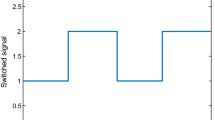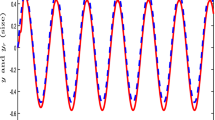Abstract
In this paper, the event-triggered adaptive control for a class of series elastic actuator systems is considered. To solve this problem, firstly we propose an adaptive control scheme with a novel one-step design framework such that both the controller expression and parameter estimator are much simpler than related existing recursive design approaches. Then a set of event-triggering conditions is designed which is updated for each triggering. The ISS assumption is not needed for control design. It is shown that the proposed control schemes guarantee that all the closed-loop signals are semi-globally bounded and the stabilization error converges to the origin asymptotically. The zeno behavior is avoided. Simulation results illustrate the effectiveness of our scheme.
Similar content being viewed by others
References
Y. Yu and C. Lan, “Design of a miniature series elastic actuator for bilateral teleoperations requiring accurate torque sensing and control,” IEEE Robotics and Automation Letters, vol. 4, no. 2, pp. 500–507, 2019.
S. Wolf, G. Grioli, O. Eiberger, W. Friedl, M. Grebenstein, H. Höppner, E. Burdet, D. G. Caldwell, R. Carloni, M. G. Catalano, D. Lefeber, S. Stramigioli, N. Tsagarakis, M. van Damme, R. van Ham, B. Vanderborght, L. C. Visser, A. Bicchi, and A. Albu-Schäffer, “Variable stiffness actuators: Review on design and components,” IEEE/ASME Trans. Mechatronics, vol. 21, no. 5, pp. 2418–2430, Oct. 2016.
S. Oh and K. Kong, “High-precision robust force control of a series elastic actuator,” IEEE/ASME Trans. Mechatronics, vol. 22, no. 1, pp. 71–80, 2017.
G. Mathijssen, D. Lefeber, and B. Vanderborght, “Variable recruitment of parallel elastic elements: Series-parallel elastic Actuators, no. SPEA) with dephased mutilated gears,” IEEE/ASME Trans. Mechatron., vol. 20, no. 2, pp. 594–602, Apr. 2015.
K. Kong, J. Bae, and M. Tomizuka, “A compact rotary series elastic actuator for human assistive systems,” IEEE/ASME Trans. Mechatron., vol. 17, no. 2, pp. 288–297, Apr. 2012.
A. Calanca and P. Fiorini, “Human-adaptive control of series elastic actuators,” Robotica, vol. 32, no. 8, pp. 1301–1316, Dec. 2014.
J. Pratt, B. Krupp, and C. Morse, “Series elastic actuators for high fidelity force control,” Int. J. Ind. Robot, vol. 29, no. 3, pp. 234–241, 2002.
N. Paine, S. Oh, and L. Sentis, “Design and control considerations for high performance series elastic actuators,” IEEE/ASME Trans. Mechatronics, vol. 19, no. 3, pp. 1080–1091, 2014.
J. Lu, K. Haninger, W. Chen, and M. Tomizuka, “Design and torque-mode control of a cable-driven rotary series elastic actuator for subject-robot interaction,” Proc. IEEE Int. Conf. Adv. Intell. Mechatronics, pp. 158–164, 2015.
M. Laffranchi, L. S. Chen, N. Kashiri, J. Lee, N. G. Tsagarakis, and D. G. Caldwell, “Development and control of a series elastic actuator equipped with a semi active friction damper for human friendly robots,” Robot. Autonom. Syst., vol. 62, no. 12, pp. 1827–1836, Dec. 2014.
M. Wang, L. Sun, W. Yin, S. Dong, and J. Liu, “Continuous robust control for series elastic actuator with unknown payload parameters and external disturbances,” IEEE/CAA J. of Autom. Sinica, vol. 4, no. 4, pp. 620–627, Oct. 2017.
C. H. Zhang and G. H. Yang, “Event-triggered adaptive output feedback control for a class of uncertain nonlinear systems with actuator failures,” IEEE Trans. on Cybernetics, vol. 50, no. 1, pp. 201–210, 2020.
H. Wang and G. H. Yang, “Decentralized event-triggered H-infinity control for affine fuzzy large-scale systems,” IEEE trans. on Fuzzy Systems, vol. 27, no. 11, pp. 2215–2226, 2019.
X. Li, D. Ma, X. Hu, and D. Ho, “Dynamic event-triggered control for heterogeneous leader-following consensus of multi-agent systems based on input-to-state stability,” International Journal of Control, Automation, and Systems, vol. 18, no. 2, pp. 293–302, 2020.
J. Huang, L. Chen, X. Xie, M. Wang, and B. Xu. “Distributed event-triggered consensus control for heterogeneous multi-agent systems under fixed and switching topologies,” International Journal of Control, Automation, and Systems, vol. 17, no. 8, pp. 1945–1956, 2019.
G. Xu, J. Huang, and X. Su, “Decentralized adaptive control of interconnected nonlinear systems with unknown control directions and actuator failure,” International Journal of Control, Automation, and Systems, vol. 17, no. 1, pp. 29–37, 2019.
J. Li, X. Chen, F. Hao, and J. Xie. “Event-triggered bipartite consensus for multi-agent systems with antagonistic interactions,” International Journal of Control, Automation, and Systems, vol. 17, no. 8, pp. 2046–2058, 2019.
J. Huang, W. Wang, C. Wen, and G. Li, “Adaptive event-triggered control of nonlinear systems with controller and parameter estimator triggering,” IEEE Transactions on Automatic Control, vol. 65, no. 1, pp. 318–324, 2020.
J. Huang and Q.-G. Wang, “Event-triggered adaptive control of a class of nonlinear systems,” ISA Transactions, vol. 94, pp. 10–16, 2019.
J. Huang, C. Wen, W. Wang, and Z.-P. Jiang, “Adaptive output feedback tracking control of a nonholonomic mobile robot,” Automatica, vol. 50, pp. 821–831, 2014.
J. Huang and Q.-G. Wang, “Decentralized adaptive control of interconnected nonlinear systems with unknown control directions,” ISA Transactions, vol. 74, pp. 60–66, 2018.
J. Huang, L. Zhao, and Q.-G. Wang, “Adaptive control of a class of strict feedback nonlinear systems under replay attacks,” ISA Transactions, vol. 107, pp. 134–142, 2020.
J. Huang, Y.-D. Song, W. Wang, and C. Wen, “Smooth control design for adaptive leader-following consensus control of a class of high-order nonlinear systems with time-varying reference,” Automatica, vol. 83, pp. 361–367, 2017.
J. Huang, C. Wen, W. Wang, and Y.-D. Song, “Adaptive finite-time consensus control of a group of uncertain nonlinear mechanical systems,” Automatica, vol. 51, pp. 292–301, 2015.
K. Johansson, M. Egerstedt, J. Lygeros, and S. Sastry, “On the regularization of Zeno hybrid automata,” Systems Control Letters, vol. 38, pp. 141–150, 1999.
J. Huang, W. Wang, C. Wen, J. Zhou, and G. Li, “Distributed adaptive leader-follower and leaderless consensus control of a class of strict-feedback nonlinear systems: A unified approach,” Automatica, vol. 118, 109021, 2021.
J. Huang, Y.-D. Song, W. Wang, and C. Wen, “Fully distributed adaptive consensus control of a class of high-order nonlinear systems with a directed topology and unknown control directions,” IEEE Trans. Cybernetics, vol. 48, no. 8, pp. 2349–2356, 2018.
L. Hao and W. Lin, “Universal adaptive control of nonlinear systems with unknown growth rate by output feedback,” Automatica, vol. 42, pp. 1783–1789, 2006.
N. Fischer, R. Kamalapurkar, and W. E. Dixon, “LaSalle-Yoshizawa corollaries for nonsmooth systems,” IEEE Transactions on Automatic Control, vol. 58, no. 9, pp. 2333–2340, 2013.
J. Huang, W. Wang, C. Wen, and J. Zhou, “Adaptive control of a class of strict-feedback time-varying nonlinear systems with unknown control coefficients,” Automatica, vol. 93, pp. 98–105, 2018.
L. Xing, C. Wen, Z. Liu, H. Su, and J. Cai. “Event-triggered adaptive control for a class of uncertain nonlinear systems,” IEEE Transactions on Automatic Control, vol. 62, no. 4, pp. 2071–2076. 2017.
M. Krstic, I. Kanellakopoulos, and P. Kokotovic, Nonlinear and Adaptive Control Design, John Wiley and Sons, 1995.
J. Yook, D. M. Tilbury, and N. R. Soparkar. “Trading computation for bandwidth: Reducing communication in distributed control systems using state estimators,” IEEE Transactions on Control Systems Technology, vol. 10, no. 4, pp. 503–518. 2002.
P. Tabuada, “Event-triggered real-time scheduling of stabilizing control tasks,” IEEE Transactions on Automatic Control, vol. 52, no. 9, pp. 1680–1685, 2007.
P. Tallapragada and N. Chopra, “On event triggered tracking for nonlinear systems,” IEEE Transactions on Automatic Control, vol. 58, no. 9, pp. 2343–2349. 2013.
W. Heemels, J. Sandee, and P. van Den Bosch, “Analysis of event-driven controllers for linear systems,” International Journal of Control, vol. 81, no. 4, pp. 571–590, 2008.
Y. Gao, J. Liu, Z. Wang, and L. Wu, “Interval type-2 FNN-based quantized tracking control for hypersonic flight vehicles with prescribed performance,” IEEE Transactions on Systems, Man, and Cybernetics: Systems, vol. 51, no. 3, pp. 1981–1993, 2021.
C.-M. Lin, T.-L. Le, and T.-T. Huynh, “Self-evolving function-link interval type-2 fuzzy neural network for nonlinear system identification and control,” Neurocomputing, vol. 275, no. 31, pp. 2239–2250, 2018.
Author information
Authors and Affiliations
Corresponding author
Additional information
This work was partially supported by National Key Research and Development Program of China under grant no.2019YFB1312002, partially by National Natural Science Foundation of China under Grants 61703061, partially by Chongqing Key Laboratory on IFBDA under Grant CSSXKFKTZ201802, partially by the Basic Science and Frontier Technology Research Projects of Chongqing Science and Technology Program (General Projects) under Grants no. cstc2018jcyjAX0498 and no. cstc2018jcyjAX0297, partially by the Natural Science Foundation of Ningbo (No.2018A610074), partially by General Scientific Research Project of Department of Education of Zhejiang Province (No.Y201942413) and partially by Ningbo 2025 Major Science and Technology Innovation Project (No.2018B10009).
Tingting Gao received her B.S. and M.S. degrees in mathematics from Northeastern University, Shenyang, China, in 2005 and 2008, respectively, and a Ph.D. degree in the School of Electrical and Electronic Engineering, Nanyang Technological University, Singapore. Her research interests include high precision motion control and integrative approach for controller design for optimal performance.
Jiangshuai Huang received his B.Eng. and M.Sc. degrees in the School of Automation from Huazhong University of Science & Technology, Wuhan, China in July 2007 and August 2009, respectively, and a Ph.D. from Nanyang Technological University in 2015. He was a Research Fellow in the Department of Electricity and Computer Engineering, National University of Singapore from August 2014 to September 2016. He is currently a professor in the School of Automation, Chongqing University, Chongqing, China. His research interests include adaptive control, nonlinear systems control, underactuated mechanical system control and multi-agent system control.
Rui Ling received his B.S., M.S., and Ph.D. degrees in automation from Chongqing University, Chongqing, China, in 2002, 2009, and 2015, respectively. He is currently a professor with the College of Automation, Chongqing University. He became a Visiting Scholar at the Colorado Power Electronics Center, Boulder, CO, USA, in 2012. He has published more than 30 publications and holds eight Chinese patents. His current research interests include model and control of renewable energy systems and digital control of switchedmode power converters.
Yong Zhou received his B.Eng. and M.Eng. degrees in electrical engineering from Zhejiang University, Hangzhou, China, in 2003 and 2006, respectively, and a Ph.D. degree in the School of Electrical and Electronic Engineering, Nanyang Technological University, Singapore in 2014. His research interests includes robust nonlinear control, sliding-mode control, and precision motion control. Now he is with Yiheng Technol Co Ltd, Ningbo, Zhejiang, China.
Publisher’s Note
Springer Nature remains neutral with regard to jurisdictional claims in published maps and institutional affiliations.
Rights and permissions
About this article
Cite this article
Gao, T., Huang, J., Ling, R. et al. Adaptive Event-triggered Control of a Class of Series Elastic Actuator System. Int. J. Control Autom. Syst. 19, 2536–2543 (2021). https://doi.org/10.1007/s12555-020-0220-4
Received:
Revised:
Accepted:
Published:
Issue Date:
DOI: https://doi.org/10.1007/s12555-020-0220-4




